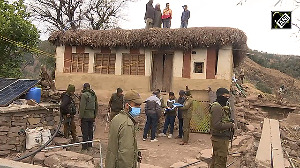
The latest remarks made by Prime Minister Narendra Modi in China, on Indians feeling ashamed to be born here until he became PM, is part of a strategy but it will prove counter-productive in the days to come.
From France to Canada, from Japan to South Korea, all of Modi's barbs came in front of an NRI audience. Over the last one year, with 19 foreign visits, Modi has tried to use diplomacy as a PR event and foreign policy as a means to shore up his image back at home, says Shehzad Poonawalla.
Hours after Narendra Modi's speeches in Shanghai and Seoul, where he, for the fifth time in a row, dragged domestic Indian politics onto the international arena by launching a veiled attack on the previous UPA government, a virtual war broke out on Twitter Tuesday morning, with the trend #ModiInsultsIndia registering over 80,000 tweets around it. Modi's comments that "there was a time when people would say, I don't know what sin I committed that I was born in India", sparked off a heated reaction not just from his opponent the Congress party but an entire cross-section of Indians who felt that his statements were unbecoming of a leader claiming to portray himself as a statesman.
Modi perhaps is the first and only prime minister to use the international platform to attack his opponents. In Japan, after gifting the Bhagwad Gita to the Japanese emperor, Modi took potshots saying that it would “irk secular friends back home”. What one did not understand is why, by labelling the Congress and other parties as “secular friends”, was he reducing himself and the BJP to a 'non-secular entity'! Isn't it too candid an admission about oneself while on foreign soil?
What Modi also forgot is that the very first page of the Constitution, beginning from the Preamble and extending on to the more substantive portions including its very basic structure, is premised around India being secular. Was his implication, then, that an ideal India and all Indians have cherished for so long is fundamentally so wrong that no less than the PM should ridicule it?
Modi repeated his attack on the Opposition when he told an audience in Toronto that our identity was that of “scam India” and it was now being transformed to “skill India” by him. Of course scams and corruption have been an issue in India just like it has been an issue in virtually every country of the world. But when Modi says that we had an identity of “scam India” one wonders how much of it was contributed by his own party's former presidents Bangaru Laxman accepting bribes on camera for defence deals or his own minister Nitin Gadkari, whose entrepreneurial ventures have been documented, chapter and verse, by the Comptroller and Auditor General in its latest report!
The latest remarks made by Modi in China, on Indians feeling ashamed to be born here until he became PM, is part of a strategy but it will prove counter-productive in the days to come. From France to Canada, from Japan to South Korea, all of Modi's barbs came in front of an NRI audience. Over the last one year, with 19 foreign visits, Modi has tried to use diplomacy as a PR event and foreign policy as a means to shore up his image back at home.
Clearly, he too acknowledges that the only way he can maintain his 'superstar image' is to elicit ‘Modi Modi chants’ from non-resident Indians. After a year of U-turns and unfulfilled promises that hardly match up to the high expectations from his government, he himself doesn't expect to get these cheers from resident Indians! By the way Modi has been abroad for about 52 days in a year which is roughly about once a week! Resident Indians, particularly farmers would have loved it, had he met them that often!
Make no mistake -- Modi is a fabulous communicator and orator and much like another eloquent communicator, Adolf Hitler, he too uses the same technique of re-iterating 'past wrongs by weak, corrupt administrations that preceded his’. It is propaganda building 101 and the entire BJP rank and file -- from ministers to spokespersons -- all have just one standard answer when you ask them what they have achieved in the last one year. 'Those who did nothing for 60 years are asking us questions about our first year!' -- can't you picture the likes of Sambit Patra dishing that out on every TV debate, night after night?
The advantage of this strategy is that it lowers expectations about oneself, something the BJP feels constrained to do given their dismal performance on every front -- economy, agriculture, jobs and even their own pet projects of Make In India and Swachch Bharat. Recently, it has been revealed that eight core sectors had registered a negative growth for the first time in 17 months, job growth had fallen by 50,000 in the quarter ending December 2014 and agriculture had slipped from a decent four per cent growth to a mere one pc!
But here is what's wrong with Modi's tactic. First, truth eventually catches up and propaganda, no matter how slick it may seem, cannot replace performance. If it could, the BJP would never have lost the 2004 elections after the 'India Shining' campaign led by an even more skillful orator like Vajpayee! Second, Modi's style reflects a sense of inherent arrogance and sense of confrontation, which is hardly healthy for a government that has secured only 31 pc of the popular mandate in a democracy as vibrant and diverse as ours. It also hamstrings any chance of co-operation that he could have expected on policy issues from the Congress and other Opposition parties in Rajya Sabha, where his government is facing a serious numbers crunch.
By the end of Tuesday evening, the #ModiInsultsIndia trend had mysteriously disappeared from the India trends section and it was replaced by the #ModiIndiasPride trend (which garnered just about 55,000 tweets), an orchestrated response by Modi's social media army. Curiously, #ModiInsultsIndia remained on the worldwide trends, leaving many to ask how that kind of jugglery was even possible!
In either case, the real test of Modi's propaganda would be the upcoming Bihar elections. If the loss in Delhi election was any indicator, he should be focusing more on the future and less on the past, more on statesmanship and less on showmanship, more on performance and less on propaganda.
As for his die-hard supporters who claim to be nationalists, one can understand their predicament of feeling proud about a really shameful statement!
Image: Prime Minister Narendra Modi with his Mongolian counterpart, Chimediin Saikhanbileg in Ulan Bator on May 17, 2015. Photograph: MEA/Flickr.
Shehzad Poonawalla is a lawyer-activist and founder-member of the governing body of the think-tank PolicySamvad.











 © 2025
© 2025